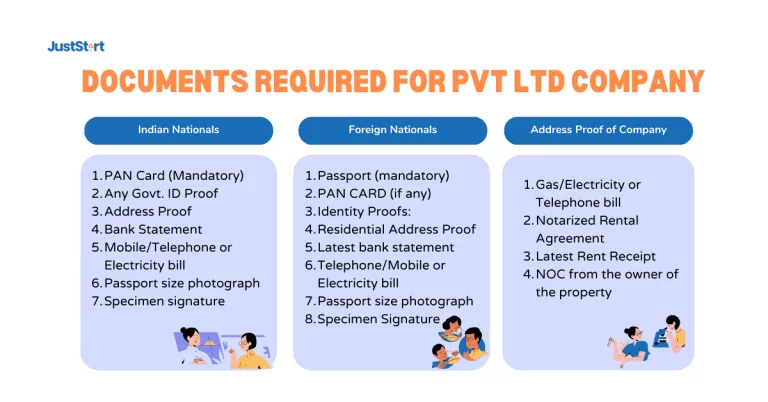Private Limited Company is the most commonly preferred choice of business owners. And do you know who the key players are in these companies? Well, those are directors.
Directors are the individuals entrusted by shareholders to take care of the organization. They are the helping hand of shareholders, as they assist them in leading their organization efficiently and achieving business objectives. If you are curious to know more about directors, their duties, and responsibilities, then you have hit the right post. We will discuss everything in detail, so fasten your seatbelts before we get started.
Table of Contents
TogglePrivate Company Directors
Directors are responsible for the management of a company, whose powers and decision-making are governed by shareholder agreements, the company’s constitution, and its duties at law.
According to the definition under the Companies Act 2013, a “director is an individual who constitutes the company’s board.” Likewise, when we mention the “Board of Directors,” it refers to a group of individuals elected by the company’s shareholders to oversee the administrative and financial aspects of their business in return for compensation.
The Role of a Director in a Company
The role of director in a company is complicated and comprehensive, which can be understood through the following points:
Agent: The directors are agents of shareholders who work to achieve the objectives of the company, generate maximum profits, and enhance the intrinsic value of shares, ultimately boosting the company’s earnings.
Employee: A whole-time director appointed for the company by the board under the approval of shareholders works like an employee of the company and is responsible for managing day-to-day company affairs.
Officer: The director is considered the company’s main officer and may face penalties under different statutes if the company’s affairs do not comply with the regulations outlined in the Companies Act, FEMA provisions, the Income Tax Act, and other relevant legal statutes applicable to various industries.
Trustee: The director is also regarded as a trustee of the company who is entrusted and vested with money and power to manage the affairs of the company.
Types of Directors
Not only is the role of directors diverse, but so are the types of directors in a company. Each director type is different from another in terms of working style, responsibilities, and a few more aspects. Let’s get a rundown on them:
Executive Directors
Executive directors are also called whole-time directors because they work for the entity as full-time employees. It is only with his or her authority that all administrative actions are undertaken by analyzing their subsequent effects.
Managing Director
The managing directors have substantial authority over managing the company’s commercial affairs. The ways in which the managing director is elected can be any of the following:
- Signing an agreement with the company
- Conducting elections among the current Board of Directors
- Passing a resolution in any of the general meetings
- Executing the Articles of Association of the company
Ordinary Director
Ordinary directors substantially differ from managing directors and executive directors. These directors become part of the board meetings of the company and look into the matters presented before the board of directors.
Additional Director
An additional director is a type of managing director that is appointed by the board between consecutive annual general meetings. He or she is elected to either occupy a casual vacancy on the board or bring additional expertise to the board. The method for election is according to what’s mentioned in the Articles of Association of the company.
Professional Directors
A professional director can be anyone who possesses professional qualifications and does not have any pecuniary interest in the company. Mostly, large organizations appoint them to utilize their degrees and professional expertise to bring efficiency to management or solve particular issues.
Nominee Director
A nominee director is a person nominated or appointed to the board by another person or entity to act on their behalf. Usually, financial institutes or equity investors who extend debt or equity support to a company, obligate to employ their personnel as nominee directors on the board.
In addition to all the above-mentioned types of directors in a company, there are a few more. For example, alternate directors, women directors, and shadow directors. Each of them has their own respective role and responsibilities in the company.
Duties of Directors
The duties of directors of a private limited company are defined under Section 166 of the Companies Act of 2013, which are as follows:
Not to Exceed Powers
Every private limited company is bound to follow the rules and regulations specified in its Articles of Association. The director makes sure the company complies with everything specified in the AoA. He or she can never go beyond what is mentioned in this important document. Whether it is regarding oppression or management, the AoA discusses everything in detail, which is the duty of the director to oversee responsibly.
Achieve the Objectives of the Company
A company is established with a well-defined objective, and it is the duty of its directors to work towards achieving that objective. The purpose or objective of a company can never change, and there is a proper procedure to achieve it. Not only one, but the company may have multiple objectives, and the directors will have to work to achieve them all.
Best Interest of the Company
Shareholders entrust directors to manage the affairs of their company, so it is the responsibility of directors to work in the best interest of the company. There should not be any kind of conflict between the directors’ personal interests and the company’s interests. Also, for any director of a private limited company, the interests of the company come first.
Compliance with the Law
Directors must comply with legal and financial laws to save the company from facing any kind of penalty. These compliances include ROC, Environment, GST, Labour Law, and many others. All these compliances are compulsory for directors to take care of; in fact, it is one of the most important duties of a director of any private limited company.
Proper Use of Assets
Every company has assets, both intangible and tangible. Directors have to ensure the assets are properly organized and used to their best capacity. Any form of misuse or improper handling of company assets is deemed unacceptable. Directors play a vital role in safeguarding the company’s resources, ensuring their optimal utilization, and maintaining the integrity of the business.
Number of Directors in a Private Limited Company
According to Section 149(1) of the Companies Act, 2013, a private limited company must have a minimum of two directors. Also, only an individual (living person) is counted as a director, which means a corporate or business entity is unacceptable as a director in a company.
The maximum number of directors in private companies can be up to fifteen, and this limit can be extended further by passing a special resolution.
Wrapping Up
Running a company is a huge task. And that is made manageable for shareholders by the directors. From managing small to major affairs, making significant decisions, and achieving the objectives of the company, the director plays a crucial role.
If you are about to set up a private limited company in India, then make sure you choose a responsible and skilled individual as your private company director. And for a smooth registration process for your private limited company, you must reach out to JustStart.








